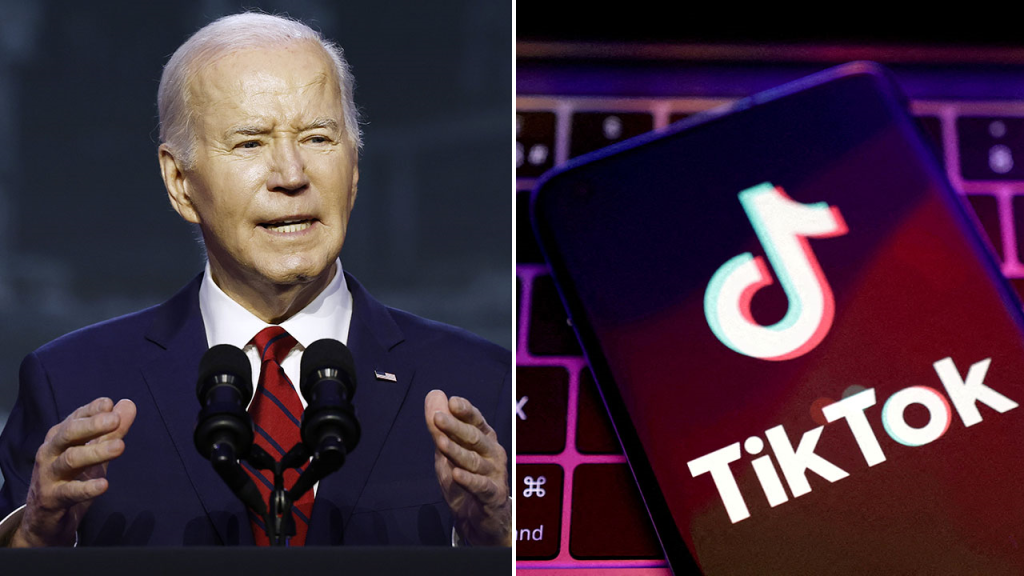China is threatening to take “resolute and forceful steps” in response to President Biden signing a bill providing foreign aid to Taiwan and forcing China-based owner of TikTok to sell the app or face a ban in the U.S. This legislation, approved by Biden last Wednesday, offers $95 billion in assistance to Ukraine and Israel, with nearly $2 billion allocated to replenish U.S. weapons provided to Taiwan and other regional allies. It gives ByteDance nine months to sell TikTok, with a possible three-month extension if a sale is in progress. China has strongly objected to the U.S. passing and signing this military aid package, which it sees as infringing upon its sovereignty and violating the one-China principle.
In response to the legislation, Chinese Foreign Ministry spokesperson Lin Jian said that this package not only includes significant military aid to Taiwan but also undermines the principles of market economy and fair competition. China believes that the legislation sends a wrong signal to “Taiwan independence” separatist forces and indicates America’s hegemonic and bullying nature. China has warned that if the U.S. continues on this path, it will take firm steps to defend its security and development interests. Taiwan, which has welcomed the legislation, is engaged in a territorial dispute with China and views the assistance as beneficial for its security.
TikTok has been accused by U.S. lawmakers of posing a risk to national security by collecting user data and spreading propaganda. China has previously stated its opposition to forcing the sale of TikTok and the company has denied being a security threat. TikTok is reportedly preparing to file a lawsuit to block the legislation that requires its sale. China’s response to the passing of this legislation indicates growing tensions between the U.S. and China, particularly in relation to Taiwan and national security concerns. The U.S. has been taking measures to counter China’s influence, which has led to retaliatory actions from China.
The legislation signed by President Biden includes significant foreign aid to Ukraine and Israel, as well as military assistance to Taiwan. China sees this as a violation of its sovereignty and a threat to the one-China principle. The U.S. lawmakers behind the legislation believe that TikTok poses a national security risk and are pushing for the sale of the app to protect user data. China’s strong objections to the legislation demonstrate the escalating tensions between the two countries, with China vowing to defend its security and development interests against what it perceives as U.S. aggression. The situation highlights the broader geopolitical and technological competition between the U.S. and China.
The U.S. legislation has further exacerbated the strained relationship between the two countries, with China threatening to take decisive action to defend its interests. The legislation not only includes military aid to Taiwan but also targets Chinese companies like TikTok, which China sees as unfair and a violation of market principles. The legislation reflects America’s concerns about national security threats posed by Chinese-owned companies and underscores the growing competition and mistrust between the two global powers. The situation is likely to escalate further as both countries seek to assert their influence and protect their interests in the face of increasing tensions and rivalries in various domains.
The conflict over the legislation highlights the geopolitical, economic, and security challenges facing the U.S. and China as they navigate their complex relationship and competing interests. The U.S. is increasingly concerned about China’s growing influence and activities in various sectors, including technology and national security. China, on the other hand, is determined to defend its sovereignty and development against what it sees as U.S. interference and aggression. The situation with TikTok and Taiwan reflects broader power struggles and ideological differences between the two countries, with potential implications for regional and global stability. The ongoing tensions indicate a challenging path ahead for U.S.-China relations and the need for careful diplomacy and strategic engagement to prevent further escalation and conflict.















